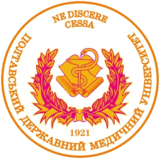Please use this identifier to cite or link to this item:
http://repository.pdmu.edu.ua/handle/123456789/22124| Title: | The feasibility of conversation analysis tool in the formative assessment of medical and dental students’ achievements in english for specific purposes |
| Authors: | Lysanets, Yu. V. Bieliaieva, O. M. Morokhovets, H. Yu. Znamenska, I. V. Shalaieva, V. S. Rozhenko, I. V. Лисанець, Юлія Валеріївна Бєляєва, Олена Миколаївна Мороховець, Галина Юріївна Знаменська, Іванна Владиславівна Шалаєва, Валерія Станіславівна Роженко, Інеса Віталіївна |
| Issue Date: | 2021 |
| Publisher: | Aluna Publishing |
| Citation: | The feasibility of conversation analysis tool in the formative assessment of medical and dental students’ achievements in english for specific purposes / Yu. V. Lysanets, O. M. Bieliaieva, H. Yu. Morokhovets, I. V. Znamenska, V. S. Shalaieva, I. V. Rozhenko // Wiadomości Lekarskie. – 2021. – Vol. LXXIV, issue. – P. 3199–3203. |
| Abstract: | The aim of this research is to demonstrate the feasibility of the Conversation Analysis Tool as an effective method of formative assessment in the context of teaching the University course of English for Specific Purposes (Medicine and Dentistry) through the implementation of elaborated and well-targeted classroom assignments and activities. Materials and methods: The paper describes the experience of applying the Conversation Analysis Tool, developed by Kenji Hakuta et al. (Stanford University Graduate School of Education). The study relied on the analysis of the transcribed classroom conversations between students in terms of different communicative dimensions. Results: Activities 1-2 focused on developing the skill of clarifying ideas in 2nd-year medical students who studied the topics “Allergy” and “Sensory Organs”. Activities 3-4 scaffolded the skills of negotiating and fortifying ideas in 1st-year dental students while they mastered the topics “Tooth Extraction” and “Dental Filings”. The authors used such scaffolding means as the Conversation Skills Poster with starter-finisher phrases, sentence frames, strategic pairings, and visuals (graphic organizers, charts). Along with a number of prompts, the fishbowl method, modeling situations, and different moves were applied depending on the situation and the material discussed. Conclusions: The Conversation Analysis Tool proved to be an effective method of formative assessment in the context of teaching the University course of English for Specific Purposes (Medicine and Dentistry). This technique discloses students’ level of understanding of the learning material, reveals the potential gaps in mastering the academic subject and allows the teacher to react timely and appropriately to eliminate them. This research will be useful for ESOL teachers at medical universities, as well as for educators from other academic settings, in the process of formative assessment and organizing classroom activities. |
| Keywords: | Conversation Analysis Tool, constructive conversation communication skills formative assessment English for Specific Purposes |
| ISSN: | 0043-5147 |
| URI: | http://repository.pdmu.edu.ua/handle/123456789/22124 |
| Appears in Collections: | Наукові праці. Кафедра іноземних мов з латинською мовою та медичною термінологією |
Files in This Item:
| File | Description | Size | Format | |
|---|---|---|---|---|
| thefeasibilityofconversation.pdf | 469,77 kB | Adobe PDF | View/Open |
Items in DSpace are protected by copyright, with all rights reserved, unless otherwise indicated.



